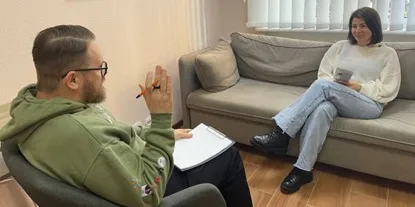
The war waged by Russia against Ukraine has been ongoing for almost three years, forcing Ukrainians to endure unimaginable hardships while seeking and finding new paths to recovery.
At the end of 2021, 30-year-old Natalia thought the worst was behind her. Even her husband's decision to leave the family could not overshadow what mattered the most - her nearly one-year old daughter was growing up healthy, proving the doctor’s dire predictions wrong. Natalia was determined to make up for the absence of her husband's support, drawing on her strength, confidence, education and experience.
On February 24, 2022, when Russian tanks and cruise missiles crossed the Ukrainian border, Natalia decided to leave Poltava with her daughter and sought refuge at her parents’ home in one of the villages in the region. Unbeknownst to them, fierce fighting was taking place nearby. The sounds of artillery were loud, and the threat of occupation made staying impossible. They fled west to Lviv, but after a month, they made the courageous decision to return home.
The depression crept in unnoticed. At first, Natalia attributed her constant fatigue to the daily chores of caring for her child. But even after her daughter went to kindergarten, the fatigue did not disappear. She felt anxious, especially when her daughter was sick.
“During the air raids, I had only one thought in my head - to cover my child with my body as soon as possible to protect her from glass shards if a missile came,” Natalia recalls.
It was then that Natalia learned about the Mental Hub, one of eleven USAID-supported spaces offering mental health and psychosocial support services in communities. The Mental Hub was created by the Light of Hope charitable organization as part of the USAID/Ukraine’s Public Health System Recovery and Resilience (PHS R&R) project. The center offers free psychological counseling for children and adults, group sessions with a psychologist, medical services, and various events on psycho-emotional health.
During the consultation, the center's psychotherapist asked Natalia if she was considering employment, noting that socialization would be very helpful. Natalia felt that without a job, life seemed to pass her by—she lacked personal growth and remained financially dependent. This, in turn, only added to her anxiety and caused insomnia. Despite recognizing the need for change, she lacked the courage to take the first step.
The therapist told Natalia about the Mind-Body Medicine (MBM) program. The unique feature of this program is that it was developed specifically for people affected by war and natural disasters and has been effectively implemented in different countries, helping to reduce stress, anxiety, depression and improve psycho-emotional state and overall quality of life.
“No one can overcome anxiety for us. No treatment will help if we don't work with it ourselves, and the program helps us to do it right. I learned many useful techniques that really help to reduce anxiety. Diaphragmatic breathing is a very useful exercise. Meditation helps me calm down before going to bed. The main thing is to want to do it, and to do it consistently and correctly,” Natalia says.
Natalia also notes another useful exercise that helps reduce anxiety: “It's called 'Safe Place'. This place can be imaginary or real. The main thing is to imagine it in all its details and feel as if you are there. I imagine an island in the middle of the sea.”
Weekly MBM group sessions run for eight weeks, with each session lasting between one and a half to two hours. Thanks to support from the PHS R&R project, the MBM program has been implemented in 67 communities in 13 oblasts of Ukraine and in the city of Kyiv. More than 6,000 residents of these communities have benefited from the program. In addition, 134 MBM facilitators were training, including social, medical, and educational workers, as well as specialists from non-governmental organizations.
The combined impact of psychotherapy sessions and MBM group sessions allowed Natalia to take an important step forward. After a long break and overcoming her insecurities, depression and anxiety, she gained the confidence to apply for a job. Today, Natalia works as an administrator at the Mental Hub, a center she is already passionate about.
“I believe that emotional and physical recovery programs should be available to as many people in Ukraine as possible. Children should learn to calm themselves down when they are anxious at school. I am glad that I have mastered these habits and now I can help others. When you have inner peace and mental balance, when you are strong in spirit, you can withstand anything.”


